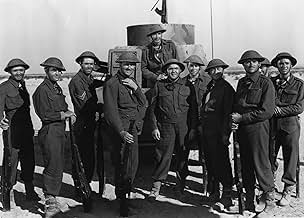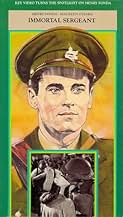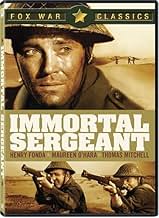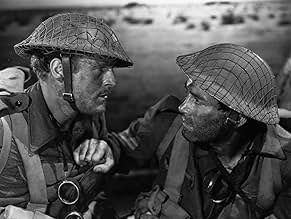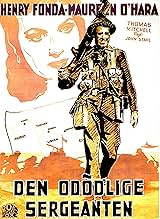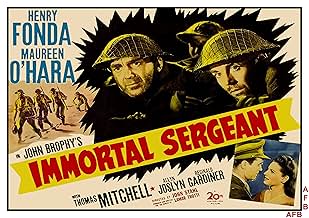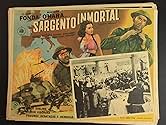NOTE IMDb
6,6/10
1,1 k
MA NOTE
Ajouter une intrigue dans votre langueDuring a WW2 patrol in the North-African desert, a Canadian corporal reminisces about his sweetheart and must lead his platoon when the sergeant gets wounded.During a WW2 patrol in the North-African desert, a Canadian corporal reminisces about his sweetheart and must lead his platoon when the sergeant gets wounded.During a WW2 patrol in the North-African desert, a Canadian corporal reminisces about his sweetheart and must lead his platoon when the sergeant gets wounded.
- Réalisation
- Scénario
- Casting principal
- Récompenses
- 3 victoires au total
John Banner
- Officer
- (non crédité)
Wilson Benge
- Waiter
- (non crédité)
Ted Billings
- Man at Train Depot as Soldiers Return
- (non crédité)
Lane Bradford
- Returning Soldier
- (non crédité)
James Carlisle
- Party Guest
- (non crédité)
Gordon B. Clarke
- Soldier
- (non crédité)
Ruth Clifford
- Nightclub Patron
- (non crédité)
James Craven
- NCO
- (non crédité)
Oliver Cross
- Nightclub Patron
- (non crédité)
Jack Deery
- Party Guest
- (non crédité)
Avis à la une
"Immortal Sergeant" was apparently not one of Henry Fonda's favorite film roles. I am not sure why "The Big Street" wasn't his least favorite (it was god-awful, believe me) but he disliked it. And, I might add, my wife wasn't super-fond a this film as we watched it. However, I really thought it was pretty good...though I do wonder if the main character played by Fonda might have been schizophrenic--that's because throughout the film he keeps hearing the voice of his sergeant--even though the guy is dead!
The film is a WWII propaganda film. Because of this, it's main thrust is NOT realism but to bolster folks' support of the war effort. I cut the film a bit of slack, as it was 1943 and keeping up morale was a major concern. What I didn't like was the casting of Fonda, as he was supposed to be a Brit--and seemed about as British as John Wayne or Hattie McDaniel! In this sense, I could see why he didn't like playing this role--but the plot is pretty good and more than makes up for this.
The sergeant in the title is played by Thomas Mitchell--and he's very good in this role. This guy is a career soldier and seems indestructible to his men--and he is adored by them. However, although he seems to have all the answers, his corporal (Fonda) seems quite different--unsure of himself and not at all the soldier Mitchell is. But, when the sergeant is killed and Fonda is left in charge of a small group of men in the North African desert, he's given a chance to show his mettle.
In many ways, this film is a lot like the film "Sahara"--though "Sahara" is a much more enjoyable (and less realistic) film. Both are set in the same locale and are about a small group of soldiers overcoming greater numbers of enemy soldiers. But the casting and script just weren't quite as good here--though the film STILL is enjoyable and did what the studio wanted it to do. I also appreciate how the men in this film were NOT indestructible--many died even though you KNEW how it all had to end. Not brilliant but quite entertaining.
The film is a WWII propaganda film. Because of this, it's main thrust is NOT realism but to bolster folks' support of the war effort. I cut the film a bit of slack, as it was 1943 and keeping up morale was a major concern. What I didn't like was the casting of Fonda, as he was supposed to be a Brit--and seemed about as British as John Wayne or Hattie McDaniel! In this sense, I could see why he didn't like playing this role--but the plot is pretty good and more than makes up for this.
The sergeant in the title is played by Thomas Mitchell--and he's very good in this role. This guy is a career soldier and seems indestructible to his men--and he is adored by them. However, although he seems to have all the answers, his corporal (Fonda) seems quite different--unsure of himself and not at all the soldier Mitchell is. But, when the sergeant is killed and Fonda is left in charge of a small group of men in the North African desert, he's given a chance to show his mettle.
In many ways, this film is a lot like the film "Sahara"--though "Sahara" is a much more enjoyable (and less realistic) film. Both are set in the same locale and are about a small group of soldiers overcoming greater numbers of enemy soldiers. But the casting and script just weren't quite as good here--though the film STILL is enjoyable and did what the studio wanted it to do. I also appreciate how the men in this film were NOT indestructible--many died even though you KNEW how it all had to end. Not brilliant but quite entertaining.
It is not as good as "An Ice Cold in Alex" but next to it. It's the same kind of desperately desolate desert with no hope, no water, only the constant peril of the Germans, all lives constantly at stake, and some occasional actual fights. Most of the action takes place in the night, so you don't see much of the arid landscape, fortunately, and there are some moments of relief. The acting is superb by everyone, Thomas Mitchell above all as the sergeant, and Henry Fonda, as the corporal, while Maureen O'Hara sparkles in all her beauty only in flashbacks. These flashbacks actually constitute the main cinematic attraction of the film, because they show the ideal life dreamed about in times of wine and roses from the utter darkness of the abyss of the desperate war situation. It's a Great War film, and the last film Henry Fonda made before enlisting for the war himself.
Some films age well, while others get noticeably worse over the years. This film falls into the second category. First, we are asked to believe that Henry Fonda is British; please. Then, we have to subjected to Thomas Mitchell, one of the worst character actors in the history of film. He always played a mischievous Irishman; how creative.
Fonda is always good; regardless of his vehicles in film and Sullivan is believable (but not as a Brit).
The production crew made a few mistakes; like the desert being sweaty at night; it is cool in the desert at night, and unbearingly hot in the day.
This leads to a few other holes in the plot. After the crew attacks and kills a German crew, why didn't they take THEIR food and water? Duh.
Second error. Why not kill the Germans while they are sleeping instead of foraging for food and water? They would have been a lot easier to kill sleeping, rather than awake and walking around with their weapons. Sorry, no sale. Had very little to do with real desert warfare.
Fonda is always good; regardless of his vehicles in film and Sullivan is believable (but not as a Brit).
The production crew made a few mistakes; like the desert being sweaty at night; it is cool in the desert at night, and unbearingly hot in the day.
This leads to a few other holes in the plot. After the crew attacks and kills a German crew, why didn't they take THEIR food and water? Duh.
Second error. Why not kill the Germans while they are sleeping instead of foraging for food and water? They would have been a lot easier to kill sleeping, rather than awake and walking around with their weapons. Sorry, no sale. Had very little to do with real desert warfare.
This is the first American film about the North Africa campaign and the last film Henry Fonda made before reporting for the war. In fact he had tried to report earlier but studio head Zanuck had him deferred until this film was made.
"The Immortal Sergeant" tells the oft-told tale of a group of soldiers at risk trying to survive. The first version I can recall was "the Lost Patrol" a 1929 British silent film remade in 1934 by John Ford. Those films were based on the 1927 novel "Patrol" and the basic theme has been repeated since (e.g., 'The Thirteen", "Sahara", "Last of the Comanches", "Kokoda").
This 1943 film is an American propaganda film using the British fighting in Africa for the setting. Though this is obviously a studio film, the camera work is pretty good and some of the action sequences look good.
The cast is rich with 40s stars like Henry Fonda, Thomas Mitchell, Maureen O'Hara, and Reginald Gardiner. But they are merely going through the motions and there is nothing here you haven't seen before.
My favorite WW 2 fighting films made between 1942 and 1944 include "Wake Island" (1942), "Bataan" (1943) which also had Mitchell, "The Fighting Sullivans" (1944), "Flying Tigers" (1942), "Guadalcanal Diary" (1943), "The North Star" (1943), "The Rats of Tobruk" (1944), and "Thirty Seconds Over Tokyo" (1944).
There are a plethora of non-fighting WW 2 films that are worthy of mention – "Casablanca" (1942), "Lifeboat" (1944), "Hangmen Also Die" (1943), and "Five Graves to Cairo" (1943).
"The Immortal Sergeant" tells the oft-told tale of a group of soldiers at risk trying to survive. The first version I can recall was "the Lost Patrol" a 1929 British silent film remade in 1934 by John Ford. Those films were based on the 1927 novel "Patrol" and the basic theme has been repeated since (e.g., 'The Thirteen", "Sahara", "Last of the Comanches", "Kokoda").
This 1943 film is an American propaganda film using the British fighting in Africa for the setting. Though this is obviously a studio film, the camera work is pretty good and some of the action sequences look good.
The cast is rich with 40s stars like Henry Fonda, Thomas Mitchell, Maureen O'Hara, and Reginald Gardiner. But they are merely going through the motions and there is nothing here you haven't seen before.
My favorite WW 2 fighting films made between 1942 and 1944 include "Wake Island" (1942), "Bataan" (1943) which also had Mitchell, "The Fighting Sullivans" (1944), "Flying Tigers" (1942), "Guadalcanal Diary" (1943), "The North Star" (1943), "The Rats of Tobruk" (1944), and "Thirty Seconds Over Tokyo" (1944).
There are a plethora of non-fighting WW 2 films that are worthy of mention – "Casablanca" (1942), "Lifeboat" (1944), "Hangmen Also Die" (1943), and "Five Graves to Cairo" (1943).
1943's The Immortal Sergeant is a tedious and overly melodramatic bit of dullness that makes you glad we won WWII. But how?
I never got a chance to suspend my disbelief with this movie. Every moment I saw characters running hither and yon, pursuing Nazis or being strafed, I reacted with a dull, throbbing irritation. The movie is so drab that whatever does get done right gets lost in the wrong.
Henry Fonda, the young Canadian soldier in the Royal Army, is such a wussburger, he's willing to let Maureen O'Hara go to a teddibly uppa-crust war correspondent (Allyn Joslyn) instead of popping him in the nose. He whines to his sergeant (the immortal one--Thomas Sullivan) that he can't have a rank of responsibility. When he takes over the patrol, he has to quell a mutiny, slaughter a bunch of Italians and Germans, and make it back to base, all the while being crippled by some of the most boring flashbacks I've ever seen.
By the time our hero gets a medal pinned on his hospital robe (yeah, he makes it), he has turned in to a nasty, kill-em-all-and-let-God- sort-them-out candidate for a commission. He tells the teddible war correspondent that if he doesn't get a letter to O'Hara telling her he wants to marry her, he'll murder the journalist friend.
Sheesh, not "I'll smack ya in the kisser" or "I'll dance on your head, but "I'll murder you."
So much for Mr. Nice Wussburger. I think I liked him better.
The Immortal Sergeant didn't teach that to Corporal Jackass.
I never got a chance to suspend my disbelief with this movie. Every moment I saw characters running hither and yon, pursuing Nazis or being strafed, I reacted with a dull, throbbing irritation. The movie is so drab that whatever does get done right gets lost in the wrong.
Henry Fonda, the young Canadian soldier in the Royal Army, is such a wussburger, he's willing to let Maureen O'Hara go to a teddibly uppa-crust war correspondent (Allyn Joslyn) instead of popping him in the nose. He whines to his sergeant (the immortal one--Thomas Sullivan) that he can't have a rank of responsibility. When he takes over the patrol, he has to quell a mutiny, slaughter a bunch of Italians and Germans, and make it back to base, all the while being crippled by some of the most boring flashbacks I've ever seen.
By the time our hero gets a medal pinned on his hospital robe (yeah, he makes it), he has turned in to a nasty, kill-em-all-and-let-God- sort-them-out candidate for a commission. He tells the teddible war correspondent that if he doesn't get a letter to O'Hara telling her he wants to marry her, he'll murder the journalist friend.
Sheesh, not "I'll smack ya in the kisser" or "I'll dance on your head, but "I'll murder you."
So much for Mr. Nice Wussburger. I think I liked him better.
The Immortal Sergeant didn't teach that to Corporal Jackass.
Le saviez-vous
- AnecdotesAccording to TCM's Robert Osborne, this was the last film Henry Fonda worked on before enlisting in the U.S. Navy during World War II.
- GaffesWhen the survivors come across the vehicle tracks after the attack on the Italian armoured car, multiple shadows of the soldiers can be seen, indicating multiple light sources.
- Citations
Sgt. Kelly: Drinking water is the worst thing in the world for a wound like mine.
[in the groin]
- ConnexionsEdited into La guerre, la musique, Hollywood et nous... (1976)
- Bandes originalesThe Campbells Are Coming
(uncredited)
Traditional
Played on the bagpipes at the beginning
Meilleurs choix
Connectez-vous pour évaluer et suivre la liste de favoris afin de recevoir des recommandations personnalisées
- How long is Immortal Sergeant?Alimenté par Alexa
Détails
- Durée1 heure 31 minutes
- Couleur
- Rapport de forme
- 1.37 : 1
Contribuer à cette page
Suggérer une modification ou ajouter du contenu manquant

Lacune principale
By what name was Aventure en Libye (1943) officially released in India in English?
Répondre

